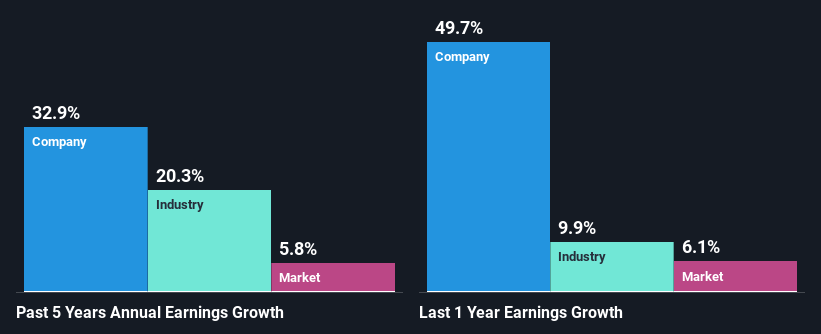
Most readers would already be aware that ABB’s (VTX:ABBN) stock increased significantly by 11% over the past three months. Since the market usually pay for a company’s long-term fundamentals, we decided to study the company’s key performance indicators to see if they could be influencing the market. In this article, we decided to focus on ABB’s ROE.
Return on Equity or ROE is a test of how effectively a company is growing its value and managing investors’ money. Simply put, it is used to assess the profitability of a company in relation to its equity capital.
Check out our latest analysis for ABB
How Do You Calculate Return On Equity?
Return on equity can be calculated by using the formula:
Return on Equity = Net Profit (from continuing operations) ÷ Shareholders’ Equity
So, based on the above formula, the ROE for ABB is:
27% = US$3.8b ÷ US$14b (Based on the trailing twelve months to December 2023).
The ‘return’ is the income the business earned over the last year. Another way to think of that is that for every CHF1 worth of equity, the company was able to earn CHF0.27 in profit.
What Has ROE Got To Do With Earnings Growth?
We have already established that ROE serves as an efficient profit-generating gauge for a company’s future earnings. Depending on how much of these profits the company reinvests or “retains”, and how effectively it does so, we are then able to assess a company’s earnings growth potential. Assuming all else is equal, companies that have both a higher return on equity and higher profit retention are usually the ones that have a higher growth rate when compared to companies that don’t have the same features.
ABB’s Earnings Growth And 27% ROE
Firstly, we acknowledge that ABB has a significantly high ROE. Secondly, even when compared to the industry average of 20% the company’s ROE is quite impressive. Under the circumstances, ABB’s considerable five year net income growth of 33% was to be expected.
As a next step, we compared ABB’s net income growth with the industry, and pleasingly, we found that the growth seen by the company is higher than the average industry growth of 20%.
Earnings growth is an important metric to consider when valuing a stock. The investor should try to establish if the expected growth or decline in earnings, whichever the case may be, is priced in. Doing so will help them establish if the stock’s future looks promising or ominous. Is ABB fairly valued compared to other companies? These 3 valuation measures might help you decide.
Is ABB Making Efficient Use Of Its Profits?
ABB has a significant three-year median payout ratio of 51%, meaning the company only retains 49% of its income. This implies that the company has been able to achieve high earnings growth despite returning most of its profits to shareholders.
Besides, ABB has been paying dividends for at least ten years or more. This shows that the company is committed to sharing profits with its shareholders. Our latest analyst data shows that the future payout ratio of the company over the next three years is expected to be approximately 45%. As a result, ABB’s ROE is not expected to change by much either, which we inferred from the analyst estimate of 25% for future ROE.
Conclusion
In total, we are pretty happy with ABB’s performance. We are particularly impressed by the considerable earnings growth posted by the company, which was likely backed by its high ROE. While the company is paying out most of its earnings as dividends, it has been able to grow its earnings in spite of it, so that’s probably a good sign. With that said, the latest industry analyst forecasts reveal that the company’s earnings growth is expected to slow down. To know more about the latest analysts predictions for the company, check out this visualization of analyst forecasts for the company.
Have feedback on this article? Concerned about the content? Get in touch with us directly. Alternatively, email editorial-team (at) simplywallst.com.
This article by Simply Wall St is general in nature. We provide commentary based on historical data and analyst forecasts only using an unbiased methodology and our articles are not intended to be financial advice. It does not constitute a recommendation to buy or sell any stock, and does not take account of your objectives, or your financial situation. We aim to bring you long-term focused analysis driven by fundamental data. Note that our analysis may not factor in the latest price-sensitive company announcements or qualitative material. Simply Wall St has no position in any stocks mentioned.







